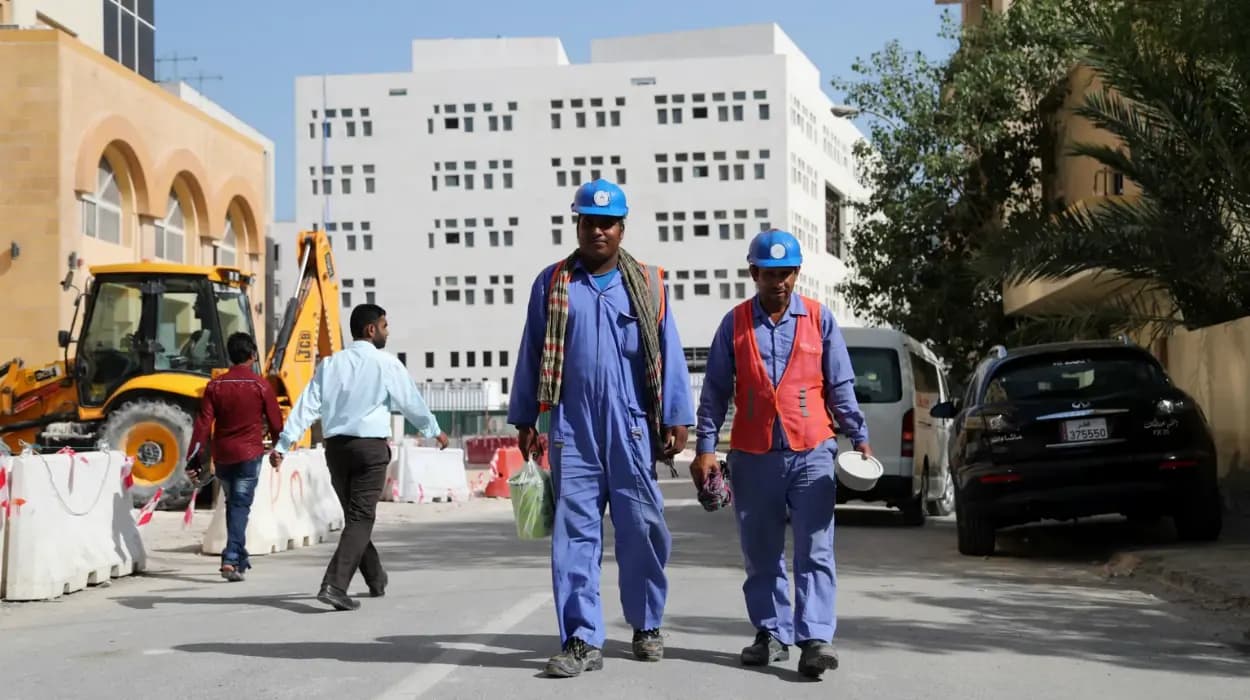Saudi Arabia Ends Kafala, Boosts Migrant Worker Rights 2025 Saudi Arabia has officially abolished its decades-old
Kafala labour sponsorship system, granting around 13 million foreign workers,
including 2.5 million Indians, enhanced job mobility, freedom of movement, and
legal protections under sweeping digital labour reforms. The changes form a key
part of Crown Prince Mohammed bin Salman's Vision 2030 plan to modernise the
Kingdom’s economy and labour market.
Historic End to the Kafala Labour Sponsorship System
In a landmark decision, Saudi Arabia has formally ended the
Kafala system that governed foreign labour for over 70 years, replacing it with
a contract-based employment model enhanced by digital oversight. As reported by
a Gulf Correspondent for Telangana Today, this regulatory overhaul means
employment contracts will now be registered and verified via digital platforms
such as Qiwa and the Wage Protection Programme,
ensuring transparency and greater protections for expatriate workers.
The Kafala system, which originated in the 1950s, previously gave employers (known as kafeels) sweeping control over migrant workers, including confiscation of passports, restrictions on changing jobs, and control over travel within and outside the country. According to journalist Nikhil Kumar at BusinessToday, under the new framework, workers can
"change jobs freely without needing their employer's approval,"
leaving or re-entering Saudi Arabia without needing exit or re-entry visas, and
have improved access to labour courts and grievance mechanisms.
Empowering Millions of Migrant Workers
The abolition directly benefits an estimated 13 million
foreign workers, with a large segment coming from South and Southeast Asia. As
detailed by Pragati Ram of StratNewsGlobal, key reforms introduced include:
- Job
Mobility: Workers can now change employers upon contract completion
without previous sponsor’s permission.
- Freedom
of Movement: Exit and re-entry visas no longer require employer
consent.
- Access
to Justice: Enhanced recourse to labour courts and dispute resolution
channels.
- Digital
Oversight: Mandatory digital registration and transparency of
contracts via platforms like Qiwa.
An official statement added by Gulf Correspondent (Telangana
Today) emphasises that earlier, sponsors could arbitrarily terminate contracts
and repatriate workers abruptly. Now, workers have the freedom to switch jobs
or return home within a designated period after contract expiry, supported by a
legal framework that minimises employer exploitation and wage delays triggering
job mobility.
Vision 2030: Modernising Labour and Economy
These reforms are integral to Saudi Crown Prince Mohammed
bin Salman’s Vision 2030, a multi-trillion-dollar initiative aimed at
diversifying the economy, creating an investor-friendly environment, and
improving Saudi Arabia’s international image. As noted by News18 World
correspondent Shubham Agarwal, Vision 2030 seeks to modernise Saudi society and
aligns labour policies with international human rights standards.
Indian diplomats described the change as a welcome
"Diwali gift" for the Indian community living in Saudi Arabia,
highlighting the significant impact on 2.5 million Indian workers.
Improving Worker Rights and Global Perceptions
The Kafala system had long faced international criticism for
enabling exploitative labour practices. Amnesty International and other rights
groups had condemned the system for contributing to worker entrapment and
abuse. As reported by India Today’s Megha Singh, while the abolition is a
positive step, experts caution that effective enforcement, awareness campaigns,
and accessible complaint mechanisms are essential for substantive change.
The reforms also signal to global investors and governments
Saudi Arabia’s commitment to transparency, fair employment practices, and the
rule of law. According to StratNewsGlobal, the shift could inspire neighbouring
Gulf Cooperation Council countries still using variations of the Kafala system
to undertake similar reforms, potentially transforming regional labour markets.
Digital Transformation of Labour Contracts
Saudi Arabia’s introduction of digital platforms is a critical aspect of the reform. Telangana Today’s Gulf Correspondent points to Qiwa as
“the only channel for mandatory formalisation of employment contracts with fixed terms.”
This digital system automatically
renews contracts annually if no term is specified, increasing accountability
for employers and reducing disputes.
The Wage Protection Programme also allows
workers to report wage delays, an issue that can now enable a worker to change
jobs if payment is withheld, improving financial security for expatriates.
Remaining Challenges and Next Steps
While these labour reforms mark a significant advance,
challenges remain. According to BusinessToday’s analysis, domestic workers—who
form a sizable part of the workforce—are subject to separate labour regulations
and may not immediately benefit from these changes.
Additionally, successful implementation will depend on the
government's ability to enforce the new legal framework and ensure workers
understand their rights. Rights activists stress continuous monitoring to
prevent any resurgence of exploitative practices under different guises.
Saudi Arabia’s abolition of its half-century-old Kafala labour sponsorship system and its replacement with a digital, contract-based employment model signify a fundamental transformation in migrant labour rights in the Kingdom. These reforms, central to Vision 2030, empower millions of foreign workers through greater job mobility, freedom of movement, and legal protections, potentially setting a precedent for the Gulf region. As the reforms roll out, close attention to enforcement and worker awareness will determine the initiative's ultimate success in reshaping Saudi Arabia’s labour landscape.
